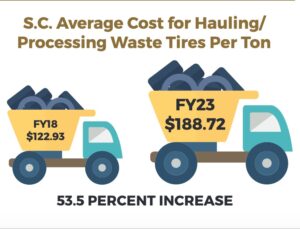South Carolina Waste Tire Management at a Crossroads
South Carolina’s waste tire management program has been a success story from its beginning in fiscal year FY1994 with counties recovering nearly 110 million tires from current generation and from stockpiles of illegally dumped or stored tires across the state, according to a new report from the South Carolina Department of Health & Environmental Control (DHEC).
The end-of-life management of waste tires in the state was initially addressed with the passage of the S.C. Solid Waste Policy and Management Act of 1991. The Act bans the disposal of whole tires in landfills; requires county governments to manage waste tires generated within the county with collection and enforcement programs; and places a $2 fee on the purchase of specific new tires to provide funding for the proper management and recycling of tires.
More than $110 million has been allocated to the program since FY94.
Now, nearly 30 years later, issues have emerged that threaten the program, DHEC’ report contends.
Two key challenges are significantly increased costs for the collection, hauling and processing of waste tires that current funding cannot match – resulting in a spiraling price tag for county governments. In turn, this may limit waste tire collection services, require moving funding from traditional recycling programs to offset costs, and result in increased storage until funding is available.
 Limited markets pose the second challenge. Markets such as tire-derived fuel, crumb rubber and civil engineering applications are available with emerging technologies on the horizon, but most current markets are not economically
Limited markets pose the second challenge. Markets such as tire-derived fuel, crumb rubber and civil engineering applications are available with emerging technologies on the horizon, but most current markets are not economically
feasible and/or face resistance from various stakeholders.
Released in December 2022, DHEC’s Waste Tire Management at a Crossroads report is designed to provide information to assist stakeholders in addressing these two challenges. It includes tire recovery data with cost and funding information as well as a checklist of possible actions for stakeholders to consider.
“Tires are essential to our lives. Proper management of waste tires is just as essential”, the report authors said.
Among the highlights, the report shows that the cost of collecting, hauling and processing tires has increased 53.5 percent from fiscal year FY 2018 to FY23 (i.e., a state average of $122.93 to an average of $188.72 per ton). Even from FY22 to FY23, there was nearly a 21 percent surge in average costs ($156.39 to $188.72).
Overall, the average cost for recovering one waste tire surged from 59 cents in FY10 to $1.70 per tire in FY21 – a 188.5 percent increase, not including the county’s overhead costs.
Current funding cannot meet expenses. FY23 is the first year that DHEC cannot fund 100 percent of the shortfall allowances (i.e., difference between contractor costs and any tipping fees that county governments charge).
On the market side, South Carolina’s 46 counties reported more than 40,000 tons of waste tires – the equivalent of more than 3.5 million tires – collected for recycling in fiscal year FY 2021. That’s more than 9,700 tires each day.
South Carolina’s waste tires are managed and recycled at even approved waste tire recycling and processing facilities with three facilities in South Carolina, and two each in Georgia and North Carolina.
Most of South Carolina’s waste tires are processed at a North Carolina facility. Seven facilities are permitted to burn waste tires and forty registered waste tire haulers operate in the state.
It is important to note that South Carolina does not have any manufacturers that are using recycled waste tires as a raw material. South Carolina does have a small tire retreading infrastructure that focuses on heavy equipment and industrial clients (including tractor trailer tires), but not passenger tires.
The S.C. Department of Commerce’s Recycling Market Development staff conducted a survey of waste tire processors in Spring 2021 which showed a reported 360,948.5 tons of tires were sent to South Carolina-registered processors in FY20. These numbers are not exclusively South Carolina tires, but a snapshot of all the tires that these processors handled in FY20.
Of that amount, an estimated 22 percent (78,327.79 tons) were disposed of. An estimated 61 percent of the tires processed were turned into tire-derived fuel (TDF). Other end-use markets were civil engineering applications (23 percent) and ground/crumb rubber for new products (14 percent).The survey also showed that no ground/crumb rubber was used in rubber surface or asphalt end-market applications.
South Carolina’s Other Tire Story
Mention South Carolina and you think of palmetto trees, beautiful beaches, amazing weather, delicious seafood or barbecue and more. You should also think tires – particularly new tires. South Carolina leads the nation in both the production – about 133,000 per day – and export sale of tires accounting for nearly 40 percent of the U.S. market share according to the S.C. Department of Commerce. These tire manufacturers call South Carolina home: Michelin; Bridgestone; Continental; Giti; and Trelleborg.
© Scrap Tire News, April 2023






